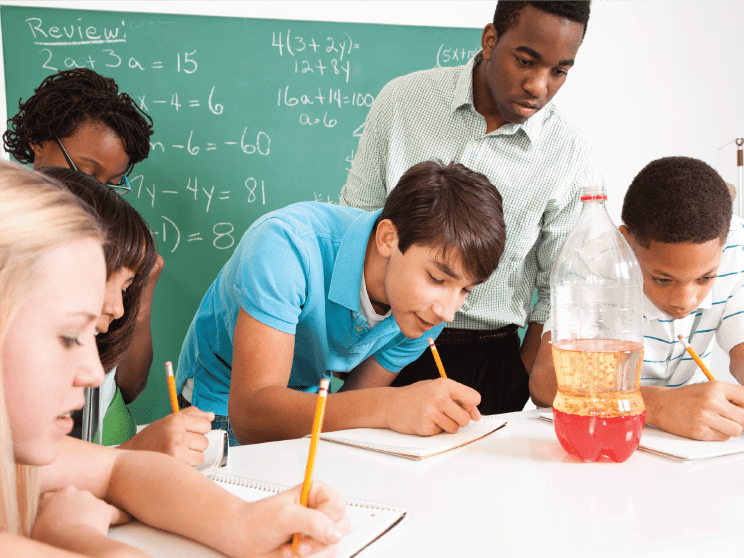Not many Cicero-North Syracuse High School students can say they spent two years conducting a research project on the flu vaccine and attending networking events with prominent members of the STEM field. But C-NS senior Isabella Perkins received all those opportunities from a Syracuse University program.
Since its inception about 35 years ago, in 1986, SU’s Science and Technology Entry Program has provided academic support services to students in seventh through 12th grade in schools within Onondaga County. The program prepares students for college and allows them to further explore opportunities in the field of science, technology, engineering and mathematics.
“I was able to do so many more things that I otherwise wouldn’t have had access to,” Perkins said.
The initiative plays an essential role in fostering the success of marginalized students in the Syracuse community, providing them with a support system and numerous academic services they otherwise wouldn’t have access to at school. Some of these services include tutoring for standardized tests, STEM courses, field trips and research opportunities.
STEP’s activities occur on Saturdays from October to May, according to the program’s website. Students receive tutoring throughout the week and participate in the Saturday Learning Academy to take classes on subjects such as forensic science. The Saturday session also offers enrichment activities, including robotics and writing.
STEP also offers a mentoring program, which pairs students with an SU undergraduate student. Before the pandemic, the program would organize trips to science museums and take students on tours to historically Black colleges and universities.
The program can have up to 140 students, and students who graduate from the program have attended and currently attend colleges such as Cornell University and Savannah College of Art and Design. Some students can also participate in the Collegiate Science and Technology Entry Program, a similar program for college students in New York.
SU’s STEP has provided academic support services to students in seventh through 12th grade since 1986. STEP’s mentoring program pairs high school students with SU undergraduate students.
Perkins, who has participated in STEP since they were in sixth grade, said while they always knew they had an interest in science, it was the program’s services that helped them figure out what branch of science they wanted to study. The college preparation course and a mentoring program for female STEP students also helped them apply for engineering colleges and SU’s College of Arts and Sciences.
“I think that really helped me to understand what I’m really interested in,” Perkins said.
Kevin Robinson, who teaches forensic science at the STEP Saturday Learning Academy, said his goal as an instructor is to give students the confidence to express their opinion in class and improve their ability to apply the material they learn to current events.
While teaching Saturday classes, Robinson wants his students to think on their own and be challenged. During lessons, Robinson solves crime scenes with his students and asks many open-ended questions that challenge them to think outside the box. If they have an opinion on something, he wants them to speak on it.
Although STEP activities usually take place on SU’s campus, COVID-19 has forced all activities to move online. While it has been challenging to keep students engaged over Zoom, the switch allowed Leonese Nelson, the STEP and CSTEP program director and principal investigator, to add activities to the program that she would have never considered before, including a virtual coding camp for girls through the Western New York STEM Hub.
Olivia Davis, a senior at Christian Brothers Academy who’s in her second year at the program, said that, while she misses the in-person aspect of the program, the switch to virtual STEP classes has been more convenient with her busy schedule and has allowed instructors to become more flexible with office hours.
Guidance from staff members and the STEP college preparation class has helped Davis figure out what she wants to study in college and which universities are the best fit for her. She encourages students to join the STEP program because they wouldn’t have the chance to receive this type of guidance at school.
“I think students do need a place that they feel comfortable to share their ideas and that people will be there to help enhance their learning,” Davis said.
Erika Lovette Turner, the assistant director of STEP, participated in the program when she attended T. Aaron Levy Middle School in Syracuse. Her school didn’t expose her to many science and technology subjects or HBCUs, she said, which is why it is important to have a program like STEP that provides students avenues to explore various STEM career fields they otherwise would not have access to.
“Especially for minorities, especially for young ladies, is highly important to show them that these fields are tangible to you, too. They’re accessible,” she said. “You can do this, you’re smart enough to just like anybody else, you can pass a test. We’re here to help you and support you through that.”
Nelson hopes the staff members are making a difference in the lives of students, which is the ultimate goal of the program. For her, it’s fulfilling to see the students learn to navigate their career path and grow into successful people in the workforce.
“I think all of my students are who they are,” she said. “I’m grateful for that.”
Courtesy: Daily Orange
